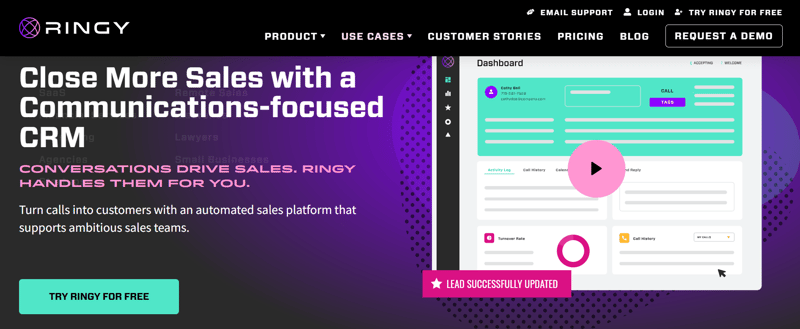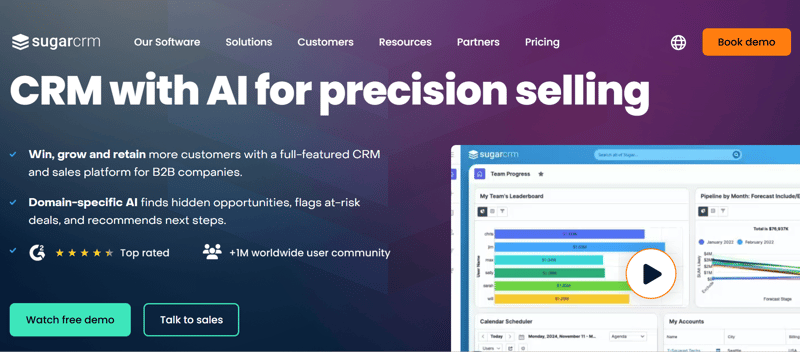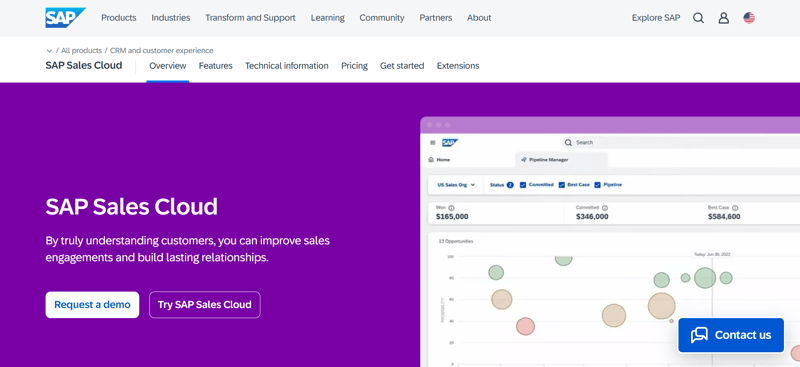
Manufacturer CRM: Optimize Your Business with Ringy
 Updated on
Updated on
 By Katie Bowman
By Katie Bowman
Katie Bowman
Katie has extensive experience in customer service and enjoys the opportunity to help others. She is committed to providing high-quality service and d...
learn more
Katie Bowman
Katie has extensive experience in customer service and enjoys the opportunity to help others. She is committed to providing high-quality service and d...
Table of Contents
Table of Contents
Manufacturers need to do more than just manage the supply chain. You need to manage people, too.
You've not only got your own sales team and factory floor crew to think about but add on retailers to ship to, distributors to work with, and suppliers to keep happy… and that's before we've even considered your customers.
So, how do you manage all of these relationships? How do you keep track of all those crucial conversations and keep your assembly line moving?
You could rely on instinct and memory and let consistency and accuracy fall by the wayside. Or, you could:
- Maintain close relationships with people in the chain
- Slim down your sales funnel to maximize ROI
- Keep all of your conversations in one easy-to-access place
You can have all of this with a sleek, superfast manufacturer CRM, tailored to your needs.
Let's explore how.
What Is a CRM for Manufacturers?
A CRM for manufacturers is a specialized customer relationship management system designed to handle the unique workflows and relationships within the manufacturing industry.
Unlike general-purpose CRMs built for service or retail businesses, CRM manufacturing software integrates sales, production, supply chain, and customer management into one unified platform. It goes beyond tracking leads, and connects production forecasts, distributor networks, and order pipelines to ensure nothing slips through the cracks.
Without a tool built for this reality, manufacturers are stuck playing data detective. In fact, some studies show that salespeople spend as little as 28% of their week really selling. The rest is lost to administrative sludge and hunting for information.
A dedicated manufacturer CRM platform is designed to fix the classic industrial headaches:
- Fragmented Communication: It stops the "Who spoke to this distributor last?" nightmare. All quotes, emails, calls, and service tickets live in one place.
- Inefficient Sales Tracking: A CRM manufacturing software tracks complex bids, quote revisions, engineering sign-offs, and project statuses.
- Missed Opportunities: It gives your team visibility into aftermarket service, spare parts, and warranty renewals, turning your service center into a proactive revenue-generator instead of just a cost center.
Top Benefits of Using CRM in Manufacturing

When you implement a CRM for manufacturers, you're not just buying software; you're upgrading your entire commercial operation. The benefits go far beyond a tidy contact list.
|
Benefit |
The Real-World Win |
|
Improved Sales & Close Rates |
Your team spends less time digging for data and more time selling. It tracks complex bids and distributor pipelines so no lead falls through the cracks. |
|
Enhanced Customer Loyalty |
Turns your service department into a profit center. You keep customers happy (and re-ordering) by managing service, parts, and warranties in one place. |
|
Accurate Demand Forecasting |
Your sales pipeline finally talks to your production schedule. This stops the expensive guesswork, reducing costly over-stock and painful stockouts. |
|
Supply Chain Visibility |
Get the right answer to "Where's my order?"—fast. It provides a single view of an order from the initial quote to the final delivery. |
|
Product Quality & Compliance |
Spot problems before they become recalls. It creates a direct feedback loop from customer complaints straight to your engineering and quality teams. |
|
Better Collaboration |
Ends the "spreadsheet wars." Everyone from the sales rep on the road to the manager on the factory floor works from the same, up-to-date playbook. |
Improved Sales and Close Rates
This is the big one. Your sales cycle is long and complex, involving bids, revisions, and multiple decision-makers. A manufacturer CRM is built to track this entire journey. It gives your team precision control over every lead, distributor, and reseller channel.
The result? Less fumbling for data and more time selling. In fact, companies using a CRM can see sales productivity jump by as much as 34% and overall sales increase by 29%.
Enhanced Customer Satisfaction & Loyalty
In manufacturing, the first sale is often just the beginning. The real profit is in the long-term relationship: the service contracts, spare parts, and repeat orders. A CRM excels at managing this after-sales service.
When a customer calls, your team has their entire history, every machine, every service ticket, every past order, right in front of them. Considering it can cost 5 to 25 times more to acquire a new customer than to keep an existing one, locking in that loyalty is pure profit.
Accurate Demand Forecasting
Stop guessing and start planning. A CRM manufacturing software connects your sales pipeline directly to your inventory and production schedule. When your sales team updates a major deal to "80% likely to close," that data provides an early warning to purchasing and production.
This kind of predictive insight is a game-changer, with some reports showing forecast accuracy improving by up to 42%. That means no more capital tied up in parts you don't need or, even worse, losing a deal because of a stockout.
Supply Chain Visibility
"Where's my order?" A generic CRM has no idea. A CRM built for CRM in manufacturing integrates with your ERP and SCM systems. It provides end-to-end order management, allowing your sales and service teams to give customers a real-time answer without having to put them on hold and call three different departments.
Product Quality & Compliance
A good CRM manufacturing platform becomes your central nervous system for customer feedback.
Every service call, complaint, and warranty claim is logged. This data isn't just for the service team; it creates a direct feedback loop to your engineering and quality assurance departments. You can spot defect trends or compliance issues instantly, turning customer problems into product improvements.
Better Collaboration Across Teams
This is where it all comes together. The single biggest problem a CRM manufacturer solution solves is the data silo. Without it, sales has one set of numbers, production has another, and service is working off a different spreadsheet entirely.
A CRM becomes the single source of truth, ensuring that everyone, from the rep on the road to the manager on the factory floor, is working in sync.
Essential CRM Manufacturing Software Features

Okay, so what features actually matter? A generic CRM gives you a "contacts" tab and a "deals" pipeline. That's not going to help when you're trying to manage a three-state distributor network and a complex bill of materials.
A true CRM manufacturing software is built with industrial-grade tools. Here are the non-negotiables.
1. Lead and Opportunity Management for Distributors/Dealers
Your sales process isn't just B2B; it's often B2D (Business-to-Distributor). You need a system that can track opportunities through your partners.
A good CRM for manufacturers lets you manage partner pipelines, share qualified leads, and see which distributors are performing and which ones need support. It stops channel conflict before it starts and gives you a true view of your total market pipeline, not just the deals your internal team is chasing.
2. Automated Quoting and Order Tracking
Let's face it: your quotes aren't simple. They involve custom configurations, fluctuating material costs, and engineering approvals. Relying on spreadsheets for this is a recipe for error. A CRM in manufacturing integrates (or includes) Configure, Price, Quote (CPQ) tools.
This lets your team generate complex, accurate, and professional-looking quotes in minutes, not days. Once the quote is approved, the CRM converts it to an order and tracks it all the way to a "shipped" status.
3. Inventory and Supply Chain Integration
This is a big one. Nothing kills a deal faster than your salesperson promising a 4-week lead time, only to find out production is backed up for 4 months. A manufacturer CRM must connect to your inventory and supply chain data.
This gives your sales team real-time visibility into what's on the shelf, what's in production, and what the actual lead time is. They can sell confidently, and you can prevent costly (and embarrassing) over-promising.
4. Customer and Partner Portals
Your partners and high-volume customers shouldn't have to call you for every little thing. A portal is a secure, 24/7 window into your business. It allows distributors to register new deals, check order statuses, and access technical documents.
A manufacturer CRM also allows end-customers to submit service tickets and track their support history. This frees up your internal teams from answering repetitive questions and gives your partners the professional tools they need to sell more for you.
5. Reporting & Analytics Tailored to the CRM for Manufacturing Industry
Generic sales reports like "calls made" are useless to you. The CRM for manufacturing industry needs to answer your specific questions:
- What's our bid-to-win ratio on custom projects?
- Which product line has the highest warranty claim rate?
- What's the average sales cycle by distributor region?
This tailored analytics engine helps you spot trends in product quality, partner performance, and sales forecasting that a standard CRM would completely miss.
6. Mobile CRM for On-Floor or Remote Access
Your people are in motion. Your field sales reps are visiting distributor sites, and your plant managers are on the factory floor.
A mobile CRM manufacturer app is essential. It lets a rep update a quote from their car or allows a service tech to pull up a machine's entire history right next to it. It's not just a nice-to-have; it's a productivity driver.
Studies show that 65% of companies reps who have mobile access to their CRM have achieved their sales quotas.
7. Workflow Automation and Integration With ERP/MRP
This is the most critical feature. Your CRM manufacturing platform cannot live on an island. It must have robust, two-way integration with your Enterprise Resource Planning (ERP) or Material Requirements Planning (MRP) system.
This is what connects the "front office" (sales, marketing) with the "back office" (finance, production). When a deal is marked "won" in the CRM, it should automatically:
- Create the sales order in the ERP.
- Alert finance to begin invoicing.
- Signal production to start the build.
This seamless integration is what stops data from being manually re-keyed (and mis-typed), eliminating errors and creating a truly streamlined operation.
Best CRM Manufacturing Software on the Market
Now that you know what features to look for in a manufacturing CRM, here's a clutch of four brilliant out-of-the-box platforms.
Consider each of them carefully before making your final decision.
|
CRM Software |
Why should you pick it |
|
Ringy |
Ringy is crammed with amazing automation tools, communication functionality, and simple yet detailed reports. |
|
Salesforce Manufacturing Cloud |
Salesforce is a flexible CRM that provides a wealth of preset templates specifically made for manufacturing businesses |
|
SugarCRM |
SugarCRM has an impressive collection of marketing tools you can use to generate more leads. |
|
SAP Sales Cloud |
SAP is one of the best CRMs for managing customer data, financial information, and inventory. |
1. Ringy

Well… where do we start?
Ringy is a disruptive name in the manufacturing CRM space as it offers businesses the benefits of bigger platforms without the high price tag.
Not only that, but we've fine-tuned our automation features, developed a mobile application and simplified our dashboard in line with customer feedback.
Ringy is one of the easiest CRMs to get started with out of the box – you can quickly import your data and easily set up automation and communication workflows to help you hit the ground running.
2. Salesforce Manufacturing Cloud (SMC)

Salesforce is one of the market leaders in CRM software for manufacturing industry users, largely thanks to its incredible depth and series of user controls.
SMC provides manufacturing users with market-leading forecasting, planning, and sales capabilities.
Salesforce's AppExchange also provides its users with a variety of different tools and integrations for making the manufacturing sales process go a little bit smoother.
For example, you can directly import quote vendors and cloud data management tools into your dashboard. There's an immense amount of data at your fingertips, and for manufacturers, that makes for more valuable conversations with prospects and clients.
3. SugarCRM

SugarCRM is a three-pronged platform that breaks its experience down into Market, Sell and Serve. It has a particularly large library of marketing tools and templates, and its scale of personalization and customization is hard to match.
Other advantages include:
- A simple and user-friendly interface
- Advanced customer journey mapping software
- Accurate predictive forecasting
4. SAP Sales Cloud

SAP Sales Cloud strives to slim down your sales process and reduce the amount of time you spend on low-value-adding tasks. For manufacturers, it's particularly useful for viewing inventory and demand at a glance, and it's an asset to salespeople looking to manage complex B2B accounts, each with many stakeholders and long sales cycles.
Sales Cloud is also immensely transparent – there's negligible digging for data necessary, and it's easy to automate who has access to which areas of your business.
Manufacturers also enjoy Sales Cloud because of its one-platform approach to collaboration, its unified view of every customer, and its many reports and intelligent recommendations.
Conclusion: Try a Manufacturer CRM Out and Improve Your Customer Relationships

There we have it – a CRM for manufacturing really can help you make sense of all those confusing accounts and slow sales cycles.
With the right manufacturer CRM, you can:
- Cut down lead qualification times
- Keep track of all your customer data in one place
- Plan for future demand and know how to scale your sales team
- Manage all of your conversations from one page
If your manufacturing relationships are fracturing, and it's due to a lack of unified data and poor communication it's time to take Ringy for a spin.

Skyrocket your sales with the CRM that does it all.
Calling? Check. SMS? Check. Automation and AI? Check. Effortlessly keep in touch with your customers and boost your revenue without limits.

Take your sales to new heights with Ringy.
Sales in a slump? Ringy gives you the tools and flexibility you need to capture leads, engage with them, and turn them into customers.
Subscribe to Our Blog
Enter your email to get the latest updates sent straight to your inbox!
Categories
Related Articles





































































































